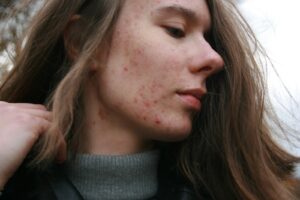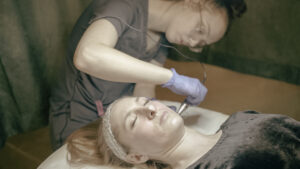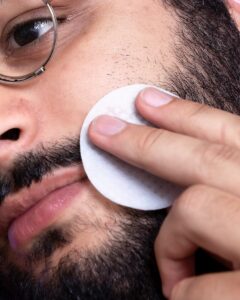Acne Scar Treatments: Effective Options for Severe Acne Scarring
Acne scars can be a lingering reminder of severe acne breakouts, affecting both appearance and self-esteem. Fortunately, a range of effective treatments exists to reduce the appearance of these scars and help individuals regain their confidence. Understanding the different types of acne scars is essential in choosing the right treatment options. This article will delve into the various types of acne scars, their characteristics, and the most effective treatments available to manage and improve the appearance of acne scars.
Understanding Types of Acne Scars

Photo by Barbara Krysztofiak on Unsplash
Acne scars vary significantly in appearance and texture, and understanding these types is crucial for effective treatment. Atrophic acne scars, often characterized by their depressed nature, develop when the skin loses collagen during the healing process. These scars include ice pick scars, boxcar scars, and rolling scars, each requiring specific approaches to treat acne effectively. Recognizing the type of acne scar is the first step toward selecting the appropriate acne scar treatment that can improve the skin’s texture and overall appearance.
Atrophic Acne Scars: Characteristics and Causes
Atrophic acne scars are typically sunken or pitted scars that result from the loss of tissue due to severe acne. These scars are commonly seen in individuals with deeper scars from inflammatory acne. Ice pick scars are narrow and deep, while boxcar scars have well-defined edges and can vary in size. Rolling scars have a wave-like appearance, making them less noticeable yet still impactful. Treatment for acne scarring often involves methods that stimulate collagen production, such as laser resurfacing or chemical peels, to help fill in and improve the texture of the layer of skin affected by atrophic scarring.
Raised Acne Scars: Understanding Hypertrophic and Keloid Scars
Raised acne scars, known as hypertrophic and keloid scars, occur when the skin overproduces collagen during the healing process. Hypertrophic scars are confined to the area of injury and may improve over time, while keloid scars extend beyond the original site, often becoming larger and more prominent. These scar types can cause discomfort due to their raised nature and may appear red and inflamed. Effective treatments include steroid injections, laser therapy, and silicone gel creams, all aimed at reducing the appearance of raised scars and restoring a smoother skin texture.
Depressed Acne Scars: Types and Treatments
Depressed acne scars can significantly affect one’s confidence, as they create noticeable indentations in the skin. These scars can be categorized into several types, including atrophic scars and various subtypes like ice pick or boxcar scars. The management of acne in its initial stages is critical to preventing these scars from forming. For those already dealing with depressed scars, treatment options may include dermal fillers, micro-needling, or advanced laser treatments that target the deeper layers of skin to stimulate collagen production and improve the overall appearance of acne scars. Choosing the right treatment for acne scarring can lead to remarkable improvements and a renewed sense of self-esteem.
Acne Scar Treatment Options

When it comes to treating acne scars, several options exist that can significantly improve the appearance of acne scars and restore confidence. Each treatment option targets specific scar types, whether it be atrophic acne scars, raised scars, or any variations in between. A consultation with a qualified dermatologist is essential to determine the most effective treatment for acne scarring based on your skin type and the severity of your scars. These treatment options range from invasive procedures like laser resurfacing to non-invasive methods such as chemical peels, each designed to reduce the appearance of scars and promote healthier skin. Understanding these options can empower individuals to make informed decisions about their acne scar treatment journey.
Laser Treatment: How It Works and Its Effectiveness
Laser treatment is a powerful option for individuals seeking to improve the appearance of acne scars, particularly atrophic scars like ice pick scars and boxcar scars. This treatment employs focused light to penetrate the skin and stimulate collagen production, aiding in the regeneration of the layer of skin affected by acne scarring. By effectively removing the top layer of skin, laser resurfacing not only reduces the visibility of scars but also promotes smoother, healthier skin. The effectiveness of laser treatment varies depending on the scar type and skin type, but many patients experience significant improvements in the texture and tone of their skin following a series of sessions. Consulting with a dermatologist can provide insights into the best laser treatment options tailored to your unique needs.
Chemical Peels: Types and Benefits for Acne Scars
Chemical peels are another effective treatment option for managing acne scars, particularly beneficial for individuals dealing with depressed acne scars. This treatment involves applying a solution to the skin that exfoliates the top layer, revealing fresher skin underneath. Different types of chemical peels are available, varying in strength and formulation based on the severity of the acne scars. Superficial peels are great for mild scarring, while deeper peels can effectively treat more severe acne scars. One of the main benefits of chemical peels is their ability to improve skin texture, reduce redness, and promote the growth of new, healthy skin cells. Regular sessions can lead to remarkable improvements in the appearance of acne scars, making this option appealing for many looking to enhance their skin’s overall appearance.
Microneedling: A New Approach to Treat Acne Scarring
Microneedling is an innovative approach to treating acne scarring that has gained popularity for its effectiveness and minimal downtime. This technique involves using fine needles to create micro-injuries in the skin, which triggers the body’s natural healing process and stimulates collagen production. This treatment can be particularly beneficial for individuals with atrophic acne scars, including rolling scars and other depressed scars. The results often include improved skin texture and a reduction in the appearance of scars. Microneedling can be combined with topical creams to enhance results and is suitable for various skin types, including those with darker skin. For anyone considering acne scar treatment options, microneedling presents a promising pathway to achieving smoother, healthier skin and renewed self-confidence.
Managing Acne and Preventing Scars

Photo by No Revisions on Unsplash
Effective Treatment for Acne: Prevention Strategies
Managing acne effectively is the first step toward preventing the development of scars. By implementing a proactive skincare routine, individuals can significantly reduce the chances of severe acne leading to permanent damage on the skin’s surface. It is essential to choose an appropriate acne treatment that suits your skin type and to avoid picking or squeezing blemishes, as this can worsen inflammation and lead to the formation of raised scars or depressed acne scars. Regular cleansing with a suitable cleanser can help remove excess oil and bacteria, while the application of non-comedogenic products can prevent future breakouts. Staying hydrated and maintaining a balanced diet rich in vitamins and minerals also plays a vital role in skin health, enhancing the skin’s ability to heal and regenerate. Ultimately, prevention strategies not only address the current acne but also safeguard against future scarring.
Skincare Regimens: Maintaining Healthy Skin Post-Treatment
After undergoing acne scar treatment, maintaining a consistent skincare regimen is crucial for sustaining results and promoting healthy skin. Incorporating gentle exfoliation into your routine can help remove dead skin cells, allowing for better absorption of topical treatments designed to improve the appearance of acne scars. It is vital to choose products that support collagen production, such as those containing retinoids or vitamin C, which can enhance skin texture and tone. Additionally, using sunscreen daily is essential to protect the skin from UV damage, which can exacerbate scar visibility and hinder healing. Hydration is another key factor; using a suitable moisturizer will keep the skin supple and aid in the recovery process. By adhering to a thoughtful skincare regimen, individuals can maximize the benefits of their acne scar treatments and enjoy healthier, more radiant skin.
Consulting Dermatologists: When to Seek Professional Help
Consulting a dermatologist is an important step for anyone struggling with persistent acne or acne scars. A professional can provide tailored advice and recommend the most effective treatment options based on the specific type of acne scar and individual skin type. If over-the-counter products have failed or if acne has become severe, it is crucial to seek expert guidance to prevent further scarring. Dermatologists can also offer advanced treatments such as laser resurfacing, chemical peels, or microneedling that are often more effective than standard acne treatments. Additionally, they can help determine if there are underlying skin conditions contributing to acne or scarring, ensuring a comprehensive approach to skin health. By prioritizing a consultation with a dermatologist, individuals can take informed steps toward achieving clearer skin and minimizing the impact of acne scars.
Home Remedies and Over-the-Counter Treatments
Natural Remedies: Do They Work for Acne Scars?
Natural remedies have gained popularity as potential solutions for managing acne scars. Many individuals seek out these alternatives, believing that they can effectively reduce the appearance of acne scars without resorting to invasive treatments. Ingredients such as aloe vera, tea tree oil, and honey are often touted for their skin-soothing and healing properties. While some people report improvements in skin texture and reduction in redness, scientific evidence supporting the efficacy of these remedies is limited. However, using natural treatments can complement other scar treatments, promoting overall skin health. It’s essential to remember that results may vary based on skin type and the severity of the scars. Thus, while natural remedies might not replace professional treatments, they can be an integral part of a holistic approach to managing acne scars.
OTC Products: Ingredients to Look for in Acne Scar Treatment
When considering over-the-counter (OTC) products for acne scar treatment, it’s crucial to know which ingredients can effectively improve the appearance of scars. Look for products containing retinoids, which can stimulate collagen production and promote skin renewal, making them particularly beneficial for atrophic acne scars. Additionally, hyaluronic acid is another essential ingredient that helps hydrate the skin and improve elasticity, which can also aid in scar management. Ingredients like salicylic acid can help treat acne while preventing new breakouts from forming, thus reducing the risk of new scars. Other beneficial components include vitamin C, which brightens the skin and helps fade hyperpigmentation, and glycolic acid, known for its exfoliating properties. By carefully selecting OTC treatments with these ingredients, individuals can effectively work towards reducing the appearance of scars and achieving healthier-looking skin.
Comparing Home Treatments with Professional Options
When weighing the effectiveness of home remedies against professional treatments for acne scars, it’s essential to consider the severity and type of acne scar. Home treatments often offer a gentler approach and can be beneficial for individuals with mild scarring. However, more pronounced scars, such as ice pick scars or rolling scars, often require the expertise and resources found in professional settings. Dermatologists can provide advanced treatment options like laser resurfacing or chemical peels, which penetrate deeper layers of skin to stimulate collagen production and significantly improve scar appearance. While home remedies may help maintain skin health and complement professional treatments, they typically do not yield the same dramatic results as clinical interventions. Ultimately, a combination of both approaches may provide the best outcome for managing acne scars efficiently.


